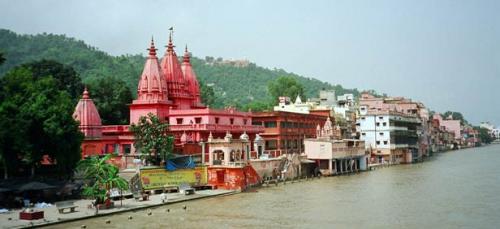Haridwar, A Place Of Peace And Power

At
Haridwar – the Gates of God – 214 km northeast of Delhi, the River Ganges
emerges from its final rapids past the Shivalik Hills to begin its long slow
journey across northern India to the Bay of Bengal. Stretching for roughly 3 km
along a narrow strip of land between the craggy wooded hills to the west and
the river to the east.
Haridwar,
or Hardwar, as it is often called, is one of the holiest places for Hindus in
India. It is significant that pilgrims often go from Haridwar to the two great
Himalayan shrines of Kedarnath and Badrinath, as Har means Shiva (the deity of
Kedarnath), Hari means Vishnu (the deity of Badrinath), and Dwar means gate.
Hardwar is therefore the gateway to the two holy shrines of Shiva and Vishnu.
Many
years ago it was also called Kapilsthan after the great sage Kapil, who lived
and meditated there. Today, Hardwar is the home of many Ashrams (hermitages and
places for meditation) and Dharamshalas (rest houses for pilgrims) that have
been established by various swamis, yogis and religious institutions. These are
amongst the most popular places
to visit in Haridwar and indeed worth visiting. Throughout the year
large numbers of pilgrims come to bathe in the Ganges, especially at the
Hari-ke-charan ghat (also called Hari-ki-Pauri), where a footprint of Vishnu is
worshipped. Pilgrims also consider it important to visit the beautiful Shiva
temple of Dakshineswar.
It is
also one of the four venues of the Kumbh Mela, which occurs after a rotation of
every twelve Years and Ardh Kumbh, celebrated after every six years. According
to mythology drops of Amrit (Elixir) fell into the Brahm Kund or Har-Ki-Pairi,
therefore a dip in the Brahma Kund on this particular day is considered very
auspicious. Haridwar links the Gangetic plains with the mountains of
Uttarakhand and their holy pilgrimage (yatra) network.
Twenty-four
kilometers north of Haridwar is another holy town named Rishikesh, meaning
“abode of the mystic sages”. These two places, Haridwar and Rishikesh, have
place-names that indicate their spiritual rather than secular attributes.
Nowadays both towns are bustling social centers; in ancient times, however,
they were quiet forests groves, nestled along rushing mountain rivers - the
perfect place for contemplation and a life in harmony with the way of nature.
Around
10 km from Haridwar there is the Rajaji National Park, which is a popular
reserved area rich with flora and fauna. You ought not miss this spot when you
are in Haridwar. Taxis and cabs are easily available. It is an ideal destination
for wildlife and adventure lovers. One may watch a herd of elephants roaming
majestically in the jungle or may find oneself excited by wildlife of many
kinds including tigers, leopard, jungle cat, Himalayan yellow throated marten,
sambar, cheetal, barking deer, wild boar, langoor, ghural, sloth beer, king
cobra, woodpecker etc.
Besides,
if you have some additional time to spare before your trip gets over head to
Dehradun. Although, not exactly a part of Haridwar tourism, it
has a completely different charm and feel and is one of the most gone-by places
in North India. It is the capital of Uttaranchal state. It is an important and
popular tourist destination of North India. The climate and location of
Dehradun makes it a popular tourist destination. Mussoorie, the queen of hills
and many nearby places attract a large number of tourists from different parts.
Post Your Ad Here
Comments